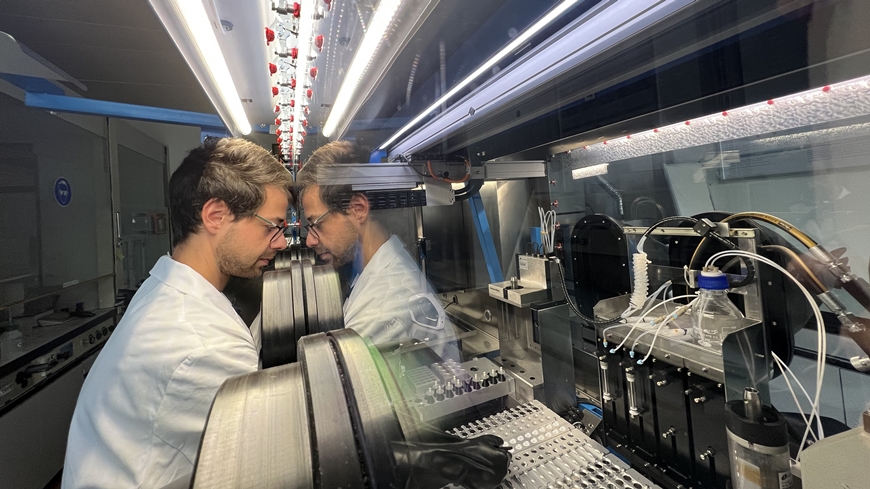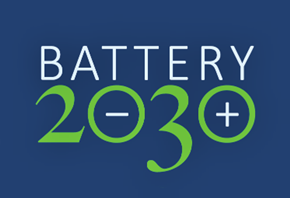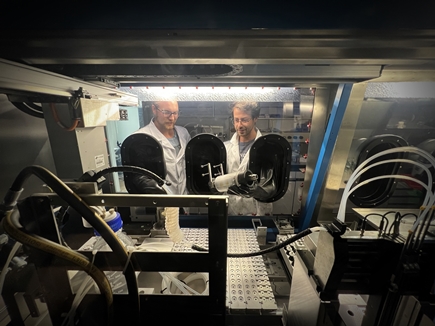Meet Aurora, the battery robot
Accelerating battery research with robots
Empa researchers want to accelerate the development of urgently needed new energy storage systems with the help of the Aurora battery robot. The Aurora project is part of the European research initiative Battery2030+, which was recently awarded over 150 million euros in funding by the EU. In addition, the project is part of the ETH Board's "Open Research Data" initiative, which promotes digitization and free access to research data.

The world urgently needs new types of energy storage. Developing completely new concepts for batteries and exploring their potential is currently a lengthy process, as Corsin Battaglia, head of Empa's Materials for Energy Conversion laboratory in Dübendorf and professor at ETH Zurich, emphasizes: "Our goal is to accelerate this process," he says. This acceleration is currently manifesting itself in the form of the Aurora robot platform, which is to take over the fully automated and, in the future, autonomous material selection, assembly and analysis of battery cells in the laboratory. As part of the European Materials Acceleration Platform, which is being set up within the European Battery2030+ project BIG-MAP, the aim is to achieve a roughly tenfold acceleration of current development processes.
For internationally competitive battery research and development, time-consuming and error-prone steps in the innovation process are now being automated using Aurora. The robotic platform is currently being further developed in the Empa laboratories together with the company Chemspeed Technologies AG. Empa researcher Enea Svaluto-Ferro is implementing the work steps and "training" Aurora. "While the robot weighs, doses and assembles the individual cell components with constant precision, initiates and completes charging cycles precisely and performs other repetitive steps, researchers can use the generated data to drive the innovation process forward," says Svaluto-Ferro.
EU invests €150 million in sustainable batteries

Battery 2030+ is a pioneering European research initiative making strides to develop the batteries of the future. Their focus is on green, high-performing, and long-lasting batteries instrumental in the transition to a carbon-neutral society.
Under Horizon Europe, the EU's research program, over €150 million funding has been awarded to cutting-edge projects coordinated by Battery 2030+. This signifies a renewed confidence in Battery 2030+ with the goal to make Europe the world leader in the development and production of green batteries. More information
Smart, autonomous and chemistry-agnostic

In future, however, Aurora will also learn to work autonomously. Using machine learning, the Aurora AI could thus create mathematical models and decide which experiments should be carried out in the next step and which materials and components are particularly promising candidates for the desired battery application. This is because the search is currently underway worldwide for new battery materials that are inexpensive, readily available and do not entail any technical disadvantages.
Since the platform can be used independently of materials, battery chemistry and generation, it could therefore be used not only to improve lithium-ion batteries, but also to develop alternative sodium-ion batteries or batteries with a self-healing mechanism in the future, Svaluto-Ferro said." "With the chemistry-agnostic Aurora, we can also bring prototypes from our labs, such as salt water batteries or solid-state batteries, to market more efficiently and quickly," says lab head Corsin Battaglia.
Aurora is not alone in this effort. The robotic platform is embedded in the ETH Board's Open Research Data initiative, which aims to promote digitization in research and make data freely available to the scientific community. One of the tools used is AiiDA, an open source workflow management system developed as part of the National Center of Competence in Research MARVEL. For the communication between the Aurora AI and the AiiDA platform, Empa researchers are currently developing the appropriate software in collaboration with researchers at EPFL and PSI. This makes Aurora the first robot platform to be coupled to the existing AiiDA system. Data will finally be transferred to the data management system openBIS, which is being developed at ETH Zurich.
For battery research, this means that the numerous process steps during battery cell development and manufacturing can be efficiently monitored and evaluated, and data can be traced back to its source at any time. "This will allow innovation processes to be further accelerated and provide Industry 4.0 with a comprehensive digitalization strategy in the field of research and development," says Empa researcher Corsin Battaglia.
Swiss Battery Days 2023
From September 18 to 20, 2023, PSI, Empa and iBAT will host the fifth Swiss Battery Days, where researchers from Switzerland and abroad will present their latest results in the fields of synthesis and characterization of battery materials and the fabrication and analysis of battery electrodes and cells, including researchers from the Aurora project.
Prof. Dr. Corsin Battaglia
Materials for Energy Conversion
Phone +41 58 765 41 31
Amira Abou-Hamdan
Chemspeed Technologies AG
PREMISE: Open and Reproducible Materials Science Research
Battery 2030+: EU invests €150 million in sustainable batteries
Open Research Data Management (ORD): Consortium wins funding for project on ORD practices
Inexpensive and stable: The salt water battery
New generation of solid state batteries: High-performance batteries with improved safety
Artificial Intelligence Driven Autonomous Lab by Chemspeed and IBM (Webinar)
NCCR MARVEL: Swiss national competence center on Computational Design and Discovery of Novel Materials, funded by the Swiss National Science Foundation
ETH Board Open-Research-Data Initiative
-
Share






